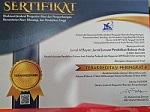Arabic Education and Modern Learning Construction in Muslim Minority Islamic Boarding School in Indonesia
Abstract
Abstract
Islamic boarding schools not only can bring up the religious enthusiasm, but also interpret Indonesia with a spirit of nationalism. Hence, it is not surprising that pesantren (Islamic Boarding School) is present to give a dedication to this nation aside from Islamic interest. Not only in the role of education,an educational institution like pesantren also had socio-cultural functions and role, a significant spiritual movement needs to be done to provide reinforcement towards empowerment within the goal of education holistically. A means that supports the learning process is the mastery of Arabic. This paper will describe the practice of Arabic teaching and learning in Muslim minority area with an approach to the principle of moderation. The research was carried out in West Papua which included five districts and one city. The results of the study showed that the application of learning that was carried out in Islamic boarding schools in Mayamuk, Aimas, Waisai, Teminabuan, Kaimana, Waigom, and Misol, was done in a well-structured. In the seven locations, Islamic education within the framework of the learning process that is based on language skills is carried out with the santri (Students) communicative approach.
The skill of the students that is trained is linguistic expression without special emphasis on grammar mastery. The environment of boarding schools that provide dormitories as a place to live becomes a tool of interaction among santri (students) in practicing language skills. The language ability of the students is adapted to the learning context along with the environment. The existing social aspects are used to support the learning process. Finally, this research concludes that differences in learning objectives and determining approach and methodological aspects will affect learning Arabic.
Keywords: Modern, Learning, Islamic Boarding School
Full Text:
PDFReferences
Abdelhay, Ashraf; Makoni, Busi; Makoni, Sinfree; dan Mugaddam, Abdel Rahim. 2011. The sociolinguistics of nationalism in the Sudan: the politicisation of Arabic and the Arabicisation of politics. Current Issues in Language Planning. Vol. 12, No. 4:457-501.
Austin, John. 1962. How to do things with word. Cambridge, MA: Harvard University Press.
Barto, Greg. 1999. Gagasan Islam liberal di Indonesia. Terj. Nanang Tahqiq. Jakarta: Paramadina.
Basyir, Zainul Fuad. 1999. KH Imam Zarkasyi tentang modernisasi pondok pesantren: studi kasus di pondok modern Gontor. Tesis Program Pasca Sarjana Universitas Muhammadiyah Malang: Malang.
Bawani, Imam. 1990. Tradisionalisme dalam pendidikan Islam. Surabaya: Al Ikhlas.
Boudelaa, Sami dan Marslen-Wilson, William D. 2013. Morphological structure in the Arabic mental lexicon: Parallels between standard and dialectal Arabic. Language and Cognitive Processes. Vol. 28, No. 10:1453-1473.
Dhofier, Zamakhsyari. 1982. Tradisi pesantren: studi tentang pandangan hidup santri. Jakarta: LP3ES.
Gellel, Adrian. 2007. Valuing the language of intergenerational wisdom in the spiritual education of children. International Journal of Children's Spirituality.Vol. 12, No. 1:1-3.
Johnson, Andrew Alan. 2013. Monks and Magic: Revisiting a classic study of religious ceremonies in Thailand. Asian Journal of Social Science. Vol. 41, No. 1:69-71.
Kazanjian, Christopher. 2012. Finding a worldly curriculum:utilizing a cosmopolitancurriculum in a global community. Journal of Global Responsibility. Vol. 3, No. 2:187-197
Mall, M. A. dan Nieman, M. M. 2002. Problems experienced with the teaching of arabic to learners in muslim private schools in South Africa and Botswana. Per Linguam. Vol. 18, No. 2: 42-54.
Moos, R. H. 1979. Evaluating educational environments. San Fransisco: Josey-Bass Publishers.
Muller, Kal. 2008. Mengenal Papua. Jakarta: Daisy World Books.
Mylek, I dan Nel, P. 2010. Religion and relief: the role of religion in mobilizing civilsociety against global poverty. Kotuitui: New Zealand Journal of Social Sciences Online.Vol. 5, No. 2:81-97.
Pace, Enzo. 2011. Religion as communication. International Review of Sociology: Revue Internationale de Sociologie. Vol. 21, No. 1:205-229.
Permani, Risti. 2011. The presence of religious organisations, religious attendance and earnings: Evidence from Indonesia. The Journal of Socio-Economics. Vol. 40: 247–258.
Purohit, T. 2011. Modern Asian Studies. Identity politics revisited: Secular and Dissonant Islam in Colonial South Asia. Vol. 45, No. 3, (May):709-733.
Rastegar, Mitra. 2008. Managing ‘American Islam’. InternationalFeminist Journal of Politics, Vol. 10, No. 4:455-474.
Tamkin, Penny. 2012. Leadership by design. Strategic HR Review. Vol. 11,No. 2: 90-95.
Wanggai, Toni Victor M. 2009. Rekonstruksi Sejarah Umat Islam di Tanah Papua. Jakarta: Badan Litbang dan Diklat Departemen Agama.
Wekke, Ismail Suardi dan Hamid, Sanusi. 2013. Technology on Language Teaching and Learning: A Research on Indonesian Pesantren. Procedia - Social and Behavioral Sciences. Vol. 83:585–589.
Wekke, Ismail Suardi. 2011. Pendidikan Islam dan pemberdayaan masyarakat (tinjauan pendidikan vokasional pesantren Rodhotul Khuffadz Sorong. Jurnal Kajian Islam Hermenia. Vol. 10, No. 1 (Desember):23-53.
Wekke, Ismail Suardi. 2012. Amalan pengajaran dan pembelajaran Bahasa Arab di Pesantren Immim Makassar, Indonesia. Tesis Ph.D. Fakulti Pendidikan Universiti Kebangsaan Malaysia: Bangi.
Woodhead, Linda. 2011. Five concepts of religion. International Review ofSociology: Revue Internationale de Sociologie. Vol. 21, No. 1:121-143.
DOI: http://dx.doi.org/10.24042/albayan.v10i2.3111
Refbacks
- There are currently no refbacks.
Copyright (c) 2018 Ismail Suardi Wekke
Editorial Office:
Jurnal Al Bayan: Jurnal Jurusan Pendidikan Bahasa Arab, Arabic Education Study Program, Faculty of Education and Teachers Training, Unversitas Islam Negeri Raden Intan Lampung
Jl. Endro Suratmin 1 Sukarame, Bandar Lampung 35131-Indonesia
e-mail: jurnalalbayan@radenintan.ac.id
http://ejournal.radenintan.ac.id/index.php/albayan/index
Jurnal Al Bayan: Jurnal Jurusan Pendidikan Bahasa Arab is licensed under a Creative Commons Attribution-ShareAlike 4.0 International License. p-ISSN 2086-9282 | e-ISSN 2549-1229









